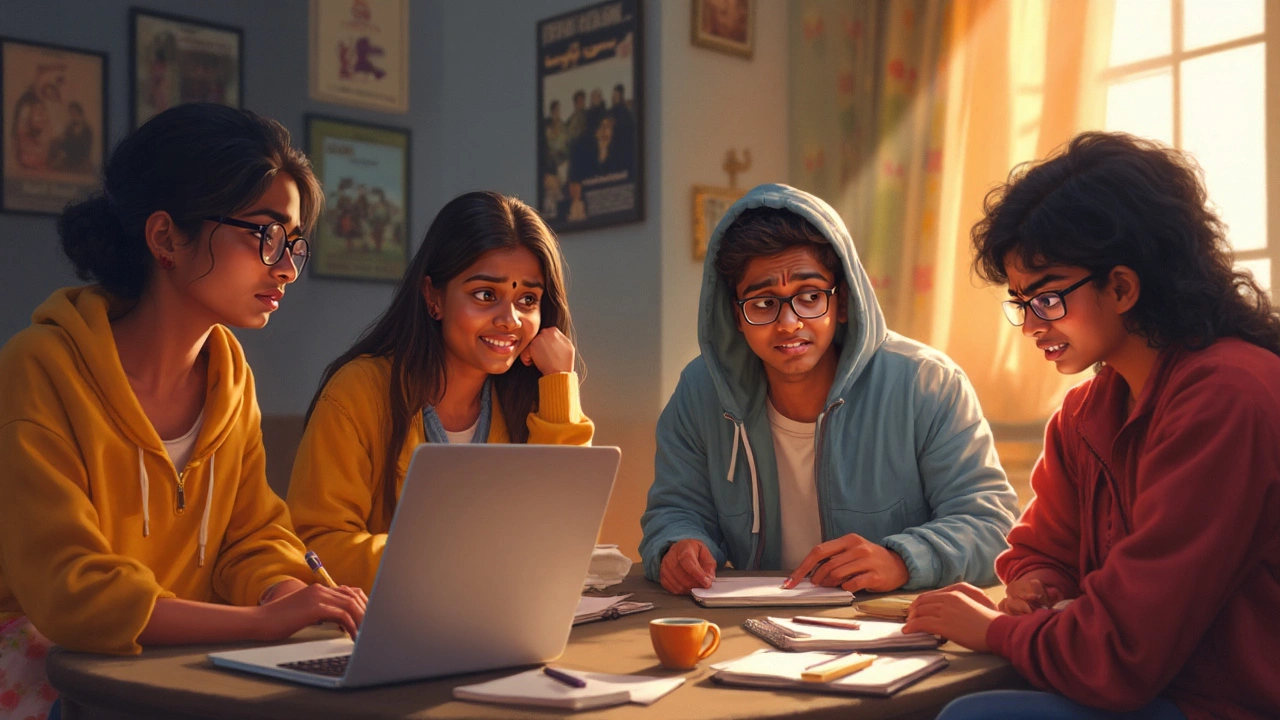Is Coding Difficult for Beginners? Real Challenges, Honest Answers & Practical Solutions
 Aug, 5 2025
Aug, 5 2025
Think coding is just for math geniuses or tech prodigies locked in dark basements, typing away at endless green numbers? Not even close. The reality is a lot less mysterious, but a whole lot messier—especially on day one. Most beginners stumble hard, sometimes questioning if they’re cut out for it at all. Yet big tech companies around the world keep adding nearly 250,000 new developer jobs in the US alone every year, according to the Bureau of Labor Statistics in 2024. If coding really was just for the gifted, how come so many people are learning it and landing jobs—even those who never imagined they'd write a single line of code?
The First Hurdle: Why Coding Feels So Hard In The Beginning
Let’s get this out: starting to code doesn’t come naturally for most folks. The most common feeling new coders report isn’t excitement—it’s confusion. Here’s the truth: figuring out what a semicolon is doing or why your program just crashed with a cryptic red error message is pretty much a rite of passage. For lots of beginners, questions fly in fast. What programming language should I even start with? Why do I need to type things exactly this way? Why does my code look like everyone else’s—but mine just won’t run?
The main problem is that coding turns you into a computer translator. You tell computers, step by step, what to do—and they literally do what you say, not what you meant. It’s frustrating at first: even a missing bracket means the difference between a working program and a total meltdown.
In 2023, Stack Overflow’s annual developer survey showed that over 65% of new learners felt lost by error messages alone. Nobody teaches you how to "think like a compiler" right away, and Googling the answer can send you on wild goose chases through forums and documentation that feel like reading another language altogether. And there’s the pace: new concepts hit you fast—variables, loops, arrays, functions. It’s not uncommon to feel overwhelmed or stuck halfway through a tutorial.
Still, the catch is that these basic frustrations aren’t a sign you’re not smart enough—they’re just part of learning something totally different from what school ever taught. Being patient here matters way more than being brilliant. According to a 2024 LinkedIn Learning study, consistent practice—even just 20 minutes a day—boosted skill retention by 60% compared to one-off marathon sessions. So, if you feel burned out after two straight hours, don’t sweat it. Coding rewards small, steady steps.
Here’s another thing people don’t talk about: your mindset. When you hit roadblocks, your brain gets anxious—sometimes, you start comparing yourself to that kid on YouTube who built an app at 14. The trick is understanding that coding skill grows with practice, just like playing guitar or cooking. It gets easier the more you do it, so if your first few projects look ugly or don’t work, join the club—literally everyone starts that way.
Breaking Down What Makes Coding Seem Complicated
So, what exactly trips people up when they try to learn coding? Let’s be specific, since vague advice doesn’t help anyone. First, there’s the sheer number of choices. Should you use Python, Java, JavaScript, or maybe C++? Each comes with its own ecosystem, tools, and quirky ways to mess up. In 2024, nearly 45% of new developer resumes mentioned starting with Python, probably because it’s readable and beginner-friendly. Still, even Python throws odd errors now and then (IndentationError, anyone?) just to keep you on your toes.
Next, the logic of coding is different from “regular” thinking. You can’t just vaguely tell a computer, “Sort my groceries by useful stuff.” You have to spell out every detail: what’s ‘useful,’ what’s not, and exactly how you want them arranged. This need to think in steps—called “algorithmic thinking”—comes with practice, so don’t panic if it doesn’t click at first.
Then comes ‘syntax’—the rules for writing every command and statement. Unlike texting a friend, a missed comma or extra space might turn your app from working magic trick to a complete disaster. Beginners often feel they’re battling the text editor, just trying to align their code so it doesn’t break. And yes, even seasoned coders sometimes forget a semicolon or bracket, so don’t beat yourself up.
Another curveball: error messages. They are famously unfriendly. “Segmentation fault,” “Null pointer exception,” and the classic “SyntaxError: Unexpected token”—these can haunt beginners’ dreams. But every error is a learning moment in disguise. Most errors are just the computer’s way of saying, “I don’t get what you meant—try again.” Stack Overflow’s 2023 data showed the most searched coding problem for beginners was “how to read error messages.” So you’re definitely not alone here.
Finally, tutorials and books can either make things easier or even harder. YouTube is packed with beginner coding videos, but many just expect you to follow along blindly, without really explaining why you’re doing what you’re doing. Don’t be shy about re-watching, pausing, or switching to a different tutor until something clicks. There’s no extra credit for sticking with a resource that confuses you.
Still feeling stuck? Try breaking big problems into tiny steps. Instead of “make a website,” start with “get one button to work.” If you keep solving mini-puzzles, those big projects start feeling less like mountains and more like a bunch of small hills.

Learning Strategies That Actually Work For Coding Beginners
Getting past the first wall is all about how you learn, not just what you learn. Top universities like MIT and Stanford openly share their intro-to-programming courses for free (seriously, check out MIT OpenCourseWare), and thousands of people have started there. In fact, Coursera reported that in 2024, its "Programming for Everybody" Python course had over 2 million active students, and the vast majority had zero programming background before they joined.
But let’s talk strategies, not just statistics. If you’re brand new, hands-on practice beats hours spent reading about code. Instead of reading a hundred pages about loops, try making a simple number guessing game in Python or a choose-your-own-adventure story. You’ll hit errors, but you’ll also remember more. And that’s huge—our brains learn best from doing, not just watching.
Ever heard of the “rubber duck debugging” trick? It’s legendary: you explain your code, line by line, to an inanimate object (doesn’t have to be a duck, but it’s more fun if it is). By putting your logic into words, problems you missed before suddenly jump out at you. Real-life coders do this all the time—not because they’re weird (well, maybe a little), but because it works.
Pair programming is also a game-changer. Sitting with a friend (or joining an online coding community like freeCodeCamp or Codecademy forums) lets you see how others approach problems. Half the time, you’ll realize everyone is struggling together, and teaching someone else is the best way to cement your own knowledge. In 2023, GitHub reported a 35% boost in problem-solving speed for new coders who collaborated vs. those learning solo for six months or more.
Don’t ignore structured breaks, either. A French study published in 2024 showed that students coding for 45 minutes and then taking a 15-minute walk improved memory and focus over those who pushed through without breaks. Rest, let your brain process the puzzle pieces, and you’ll come back sharper.
Here are a few battle-tested beginner tips:
- Set micro-goals like "print Hello World," "make a list," or "get one input working." Celebrate every mini-win.
- When you get stuck, change one thing at a time—don’t rewrite your whole code in a panic.
- Join a study group, online or offline. Coding is way less scary in company.
- Use cheat sheets. Everybody does—Google is a coder’s best friend, not a sign of weakness.
- Keep a "mistake journal." Jot down what broke your code and how you fixed it. You’ll build a manual for next time.
Trying to do everything at once—cramming new concepts, memorizing syntax, building big projects—just leads to overwhelm. Master one thing, then stack on the next.
| Common Coding Problems | How Often Beginners Face Them (%) |
|---|---|
| Getting stuck on error messages | 70 |
| Choosing a language/tool | 60 |
| Syntax mistakes | 75 |
| Losing motivation | 55 |
| Understanding logic (loops/conditions) | 63 |
| Finding helpful resources | 48 |
When Does Coding Get Easier—And How To Stay Motivated?
This is the million-dollar question: does coding ever stop feeling hard? Most new programmers notice a big shift after three to six months of regular practice. There’s no magic “aha!” moment where it all finally clicks. Instead, the confusion gradually fades, and suddenly error messages look like helpful hints instead of pure gibberish.
The real reason patience pays off? Coding is an experience sport, not a theory test. Every time you build a small project, you gain pattern-recognition muscles that pay off big when you start tackling real-world tasks—like automating boring stuff, building games, or making websites.
Motivation, though, often runs out before progress really starts. Here’s how to keep going when things get tough:
- Pick projects that actually interest you. Hate calculators? Build a music playlist sorter or a weather app instead.
- Document your journey: share wins and fails on a blog or social network. Other beginners will relate—and cheer you on.
- Switch languages or projects when burnout hits. Sometimes a new mini-project is the palate cleanser you need.
- Track your progress—use a calendar or app to check off days you coded, even if it was just 10 minutes.
- Ask questions—loudly. Forums like Stack Overflow, Reddit, or even Discord servers are filled with people happy to help new learners.
Remember, pros still Google basic questions and copy sample code. Nobody memorizes everything, and even top developers admit they spend almost as much time troubleshooting as actually coding. But those moments when your code finally works—when you see your name pop up on the screen, or your tiny script sorts a messy list—those are worth every bit of struggle.
In the end, is coding is coding difficult for beginners? It absolutely can be, especially in those early weeks—but it’s not impossible. Skills grow with each small victory, and every mistake is part of the process. The toughest coder you know once Googled “how to display text” just like you. Stick with it, break problems down, and soon enough you’ll look back and laugh at the beginner headaches you once had.